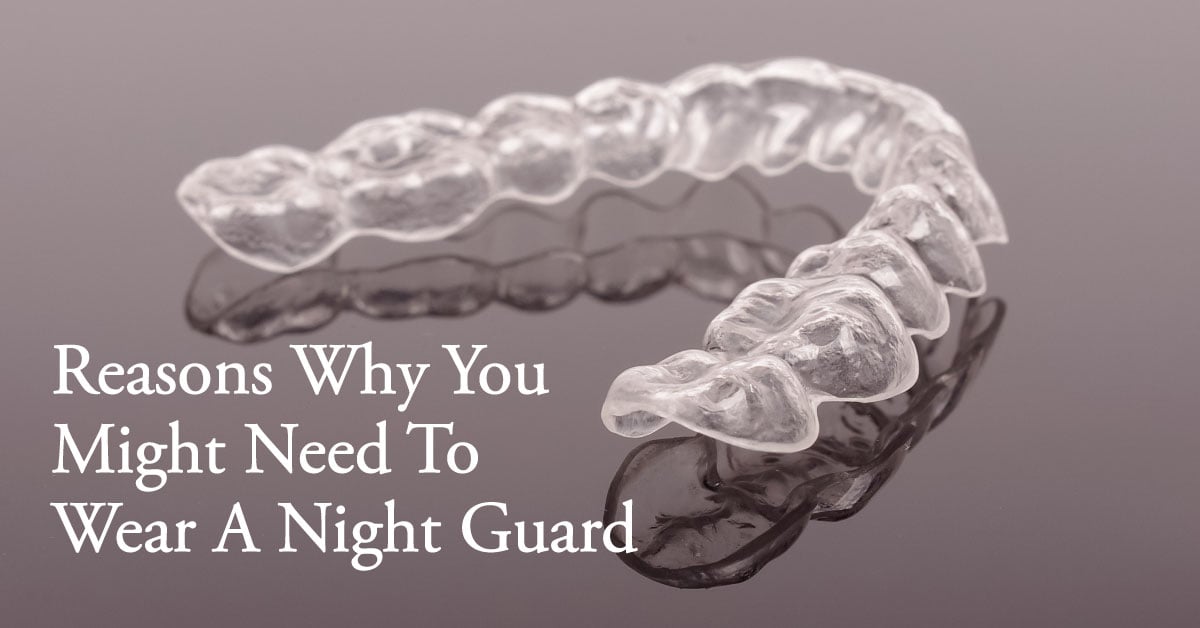
Do you wake up with a popping jaw or jaw muscles that feel tight and cramped? Chances are you’re clenching and grinding your teeth during sleep, a condition known as bruxism. Almost half of dental patients have this condition. Not just uncomfortable, it’s also potentially harmful for your teeth, gums and face. Your dentist may recommend a custom night guard to prevent ongoing problems.
“Clenching and grinding create aesthetic and functional issues. We see patients with an extensive amount of wear on their teeth,” Guelph Village Dental’s Dr. Ketan Mistry says. “We also see patients with TMD (temporomandibular disorder), a condition that results in facial pain and possible clicking and popping of the jaw.”
Sometimes patients are unaware that they’ve been clenching and grinding their teeth during the night. “We point it out to them and take pictures of the wear pattern,” Dr. Mistry explains. “The teeth may have jagged edges or chips.” Aesthetically, worn down teeth can eventually give the appearance of premature aging.
Repeated grinding of the teeth is also linked to gum recession. As you clench and grind, the natural teeth have some give. “It’s like taking a post in the ground and moving it back and forth. The level of the ground will be affected,” Dr. Mistry says. “The overload of forces negatively affects bone and gum support.”
Females are particularly prone to TMJ issues because of hormonal changes that occur at various stages in their lives that can then cause calcification of ligaments that support this complicated joint. “You can get progressive deterioration of the joints, which leads to limited opening of the jaw and can restrict the diet,” Dr. Mistry cautions.
A night guard, otherwise known as a thermoplastic bruxism splint, can protect your natural teeth from wear during sleep or other times of clenching/grinding. A custom-designed night guard is a removable appliance made from a precise impression of your teeth. Guelph Village Dental opts to create night guards for the lower teeth because a lot of patients have found it more comfortable. The night guards are made out of a thermoplastic material that softens under warm water. Users run the night guard under warm water before inserting it over the teeth at bedtime.
Dr. Mistry advises against buying the “boil and bite” devices available at drug stores. “They don’t fit well because they’re not custom-made,” he notes. “And nobody is checking that the forces are balanced. If it’s not balanced it could be doing more harm than good. And if it’s not comfortable, you won’t wear it.” Dr. Mistry says the cost of a night guard is covered by insurance companies in 90 percent of cases.
How does a night guard work?
A night guard covers one row of teeth – either the upper or the lower – so that the upper and lower teeth cannot make contact during the night. A night guard also alleviates tension in the muscles. It keeps the mouth in a slightly open position, which may improve breathing and protect the jaw from locking. It can protect your teeth and gums against wear and reduce the possibility of loosening teeth.
Care of your night guard
A night guard requires care and cleaning to keep it in good form and free of bacteria. After removing your night guard in the morning, clean it with a toothbrush and mild hand soap. Store your night guard in the sealed container it came with and keep it well away from family pets, who may find it a nice chew toy. Ensure the case itself is clean and dry before placing your night guard in it. For a deeper clean, bring your guard into our office when you are having your teeth cleaned. Follow the directions that came with your particular night guard to avoid damage. Take your night guard with you to your dental check-up so your dentist can assess its condition.
Like this post? Please share on Twitter, LinkedIn, Google+ and Facebook... or start a conversation by leaving us a comment!
